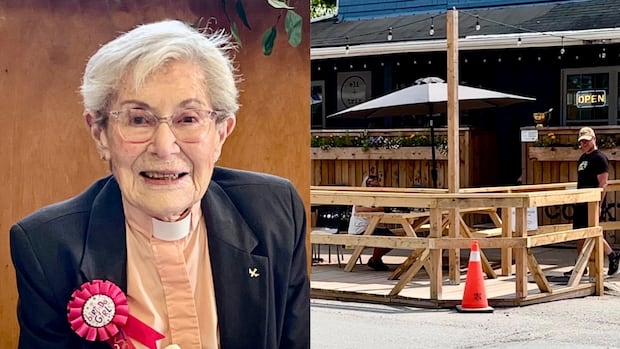‘Where do you wash your uniform?’: From working two jobs in Halifax to living in a tent

River Wowkwis Pictou couldn’t do it anymore.
It was hard holding down two full-time jobs.
They liked the work: a sales gig and a job at Tim Hortons on Young Street in Halifax. River is two-spirit and uses the pronoun they.
Except River was homeless. They had only one option: crash on a friend’s couch in between shifts.
Weeks turned to months. Wowkwis Pictou looked but there was nothing affordable. More and more exhausted, they finally broke down.
Wowkwis Pictou stopped working last summer.
They now live in a tent at a homeless encampment in downtown Halifax. It’s at Victoria Park alongside the city’s Spring Garden Road shopping district. More than 30 tents are there now.
Wowkwis Pictou wants to be working again. But for now, it’s employment insurance, about $1,200 a month. That won’t get Wowkwis Pictou very far in a city where the average rent for a one-bedroom is $1,500.
“Being homeless and trying to hold down a job is pretty difficult,” said Wowkwis Pictou. “Where do you wash your uniform?”
Wowkwis Pictou would love to go back to work.
“I honestly miss working. Not working is not something I’m used to; it’s not something I want to do.”
Wowkwis Pictou, a gentle person with glasses and hair dyed a couple of colours, would also like to finish university — undergraduate studies in arts and sciences.
No clear plan
There are more and more people without shelter and the province has no clear plan to address the crisis.
The Elizabeth Fry Society released a report earlier this month showing that the number of people sleeping outside in Halifax has more than doubled in less than a year. They surveyed 178 people living rough, up from 85 in November 2022.
SaltWire asked the Nova Scotia Department of Housing how it will respond to the report and growing homelessness.
“We have reviewed the report and its findings in full with HRM and Elizabeth Fry, and will continue to work with them to better understand the data and policy responses required.”
That’s not good enough, says Tom Urbaniak, a political science professor at Cape Breton University.
“We’re not treating homelessness as an emergency, and we should be,” says the professor.
“The emergency is getting worse. Population is growing fast, without a commensurate acceleration of decent shelters, public housing, a range of health supports to folks living on the margins, subsidized and affordable rentals conversions of large homes into multiple units, and co-ops and non-profits.”
Not safe
Wowkwis Pictou is in the middle of it. They struggle with PTSD, fibromyalgia and chronic pain and understands how vulnerable people can be, living on the streets. One rainy night early this month, Wowkwis Pictou offered to shelter a man in Victoria Park and was raped.
“You’ve got to be a little less kind and trusting on the streets,” said Wowkwis Pictou, who ended up in the emergency room that night. They also connected with Avalon Sexual Assault Centre and is considering whether to report the sexual assault to the police.
Wowkwis Pictou, who has an American Staffordshire Terrier mix named Pikaboo for safety and to help them cope with PTSD, has been on a wait list for public housing since January. A housing support worker at the Mi’kmaw Friendship Centre is helping, but the dog isn’t. Animals are not allowed in shelters in the city.
The waitlist for public housing was more than 6,000 last year. SaltWire asked the department of housing what the number is now, but the figure wasn’t provided. The department said Nova Scotia Public Housing Agency is in the process of reviewing the list to make sure it is accurate.
Urbaniak says the housing crisis demands more urgency. It’s a monumental task that requires all levels of government to respond with major housing programs similar to the those adopted during the baby boom after the Second World War.
“The whole problem was front and centre for the entire machinery of government,” said Urbaniak. “There was a national push on a large scale. I am not seeing that yet.”
Wowkwis Pictou believes it will never happen.
“It’s scary,” said Wowkwis Pictou. “I have a lot of friends who are homeless and staying wherever they can. It’s discouraging to not know how much longer you’re going to be in a situation like this.”



